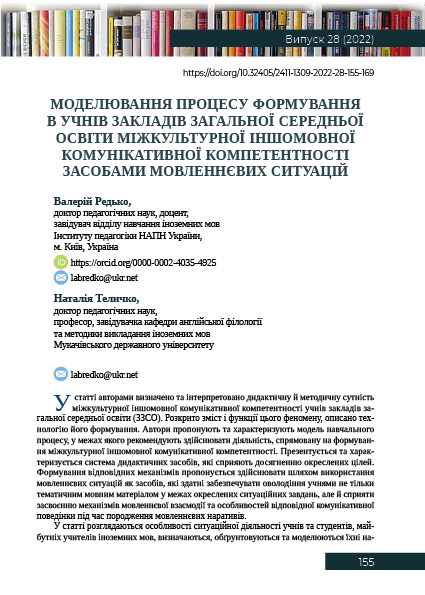Modeling the process of formation of intercultural foreign language communicative competence in students of general secondary education institutions by means of speech situations

Published 2022-07-20
Keywords
- modeling of educational process,
- formation of intercultural foreign language communicative competence,
- speech situations
How to Cite

This work is licensed under a Creative Commons Attribution-NonCommercial-ShareAlike 4.0 International License.
Abstract
In the article, the authors define and interpret the didactic and methodological essence of intercultural foreign language communicative competence of students of general secondary education (GSEI). The content and functions of this phenomenon are revealed, the technology of its formation is described. The system of didactic tools that contribute to the achievement of the outlined goals is presented and analyzed. The formation of appropriate mechanisms is proposed to be carried out by using speech situations as tools that can provide students with mastery not only of thematic language material within the outlined situational tasks, but also to promote mastery of mechanisms of speech interaction and communicative behavior during speech narratives.
The article considers the peculiarities of students’ educational activities, defines, substantiates and models their educational activities that they must perform in order to form intercultural foreign language communicative competence.
The authors define and present the functions of speech situations, which allows the teacher to orient the communicative activities of students during the production of foreign language expressions.
The main concepts of the proposed technology have been tested in school practice. The results of empirical research are also used in the content of current school textbooks in foreign languages. Positive results are observed.
Downloads
References
- Бігич, О. Б., Бориско, Н. Ф., Борецька, Г. Е. Та ін. (2013). Методика навчання іноземних мов і культур: Теорія і практика: підручник для студентів класичних, педагогічних і лінгвістичних університетів. Київ.
- Державний стандарт початкової освіти: Постанова Кабінету Міністрів України від 21.02.2018 р. № 87 (зі змінами в редакції постанови Кабінету Міністрів України від 24 липня 2019 р. № 688). https:// zakon.rada.gov.ua/laws/show/6882019-%D0%BF
- Ляшенко, О. І., Топузов, О. М. (2021). Науковий супровід модернізації змісту базової середньої освіти: проблеми і виклики. Український педагогічний журнал. 4, 29–36. https://uej.undip.org.ua/index.php/journal/article/view/247/194
- Мартинова, Р. Ю. (2004). Цілісна загальнодидактична модель змісту навчання іноземних мов. Київ. Вища школа.
- Ніколаєва, С. Ю., (наук. ред.), (2003). Загальноєвропейські Рекомендації з мовної освіти: вивчення, викладання, оцінювання. Київ: Ленвіт.
- Нова українська школа: концептуальні засади реформування середньої школи. (2016). Київ. МОН України.
- Полонська, Т. К. (2017). Сутність компетентнісно орієнтованого навчання іноземних мов у початковій школі. Педагогічна освіта: теорія і практика: зб. наук. праць Кам’янець- Подільського нац. Ун-ту імені Івана Огієнка; Інститут педагогіки НАПН України. 22 (1–2017). Ч. 2, 294–300.
- Про освіту: Закон України. (2017). https://zakon.rada.gov.ua/laws/show/2145–19
- Редько, В. Г. (2018). Теоретико-методичні засади компетентнісно- діяльнісної технології навчання іноземних мов. Fundamental and applied researches in practice of scientific schools: International Scientific Journal. 2. Volume 26, 313–320.
- Редько, В. Г. (2021). Концептуальні засади визначення цілей, змісту і структури модельних навчальних програм з іноземних мов для 5–9 класів закладів загальної середньої освіти. Український педагогічний журнал. 4, 116–125. https://uej.undip.org.ua/index.php/journal/article/view/263/206
- Редько, В. Г. (ред.), (2020). Дидактичні та методичні засади компетентнісно орієнтованого навчання іноземних мов у початковій школі: навчально- методичний посібник. Київ.
- Савченко, О. Я. (2018). Типова освітня програма для закладів загальної середньої освіти: Іншомовна галузь. Іноземна мова / розробл. Під кер.: наказ МОН України від 21.03.2018 № 268. https://mon.Gov.ua/ua/osvita/zagalna-serednya-osvita/ navchalni- programi/navchalni-programi-dlya-pochatkovoyishkoli
- Harmer, J. (2007). The Practice of English Language Teaching. England: Pearson Education Limited.
- Pinter, A. M. (2006). Teaching Young Language Learners. Oxford: Oxford University Press.
- Recommendation of the European Parliament and of the Council of 22 May 2018 on Key Competences for Lifelong Learning. Official Journal of the European Union. 4.6. 2018. https://eur-lex.europa.eu/ legalcontent/EN/TXT/PDF/?uri= CELEX:32018H0604 (01)&rid=7
- Rychen, D.-S. And Salganik, L.H. (2003). Key Competencies for Successful Life and Well – Functioning Society; Edited by Gottingen: Hogrefe and Huber Publishers.
